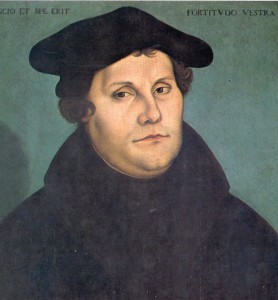 Mention of the Protestant Reformation still evokes passion 492 years after Martin Luther nailed 95 statements to the church door in Wittenburg, Germany. Luther’s “theses” as they are commonly known, begins with a call to an ongoing personal repentance in the life of every true Christian and ends with a statement of assurance grounding believers in the knowledge that “through many tribulations” they will enter the kingdom of their God.
Mention of the Protestant Reformation still evokes passion 492 years after Martin Luther nailed 95 statements to the church door in Wittenburg, Germany. Luther’s “theses” as they are commonly known, begins with a call to an ongoing personal repentance in the life of every true Christian and ends with a statement of assurance grounding believers in the knowledge that “through many tribulations” they will enter the kingdom of their God.
Ever a controversial figure, Martin Luther still receives mixed reviews about his role and place in history.
Many Roman Catholic scholars still view him as a crazed monk intent only on self-promotion and credit him with the destruction of the one true church of Jesus Christ. Some Germans hail him as an earlier version of the American president George Washington, who is affectionately known as the “father of our country.”
During the days of the Nazi regime, Luther was touted as a precursor to Hitler as his writings were ransacked in search of phrases which would provide theological ammunition for the annihilation of Jews.
To be sure, Luther was a man of his time as many of his more offensive statements about Jews reveal. Yet, most historians agree that he was a man endowed with a capacity for getting to the heart of issues through his unusual ability to read, comprehend and communicate the message of the Bible to people who had little or no knowledge of Latin (the language of the Roman Catholic mass during his day). His formal statements about the doctrine of justification were the product of both his reading of the Bible in the original languages and his aggressive pursuit of the iustitia Dei (the justice of God). For many years Luther confessed that he hated God because the absolute justice of God struck terror in his soul. After years of searching out ways to merit the grace of God through better performance of various ministerial duties as a monk (and later a professor of theology), he confessed that he “did not love” but actually “fumed against God” because of his righteous standard of meting out justice against sinners.
In his classic work, The Theology of the Reformers, Southern Baptist theologian Timothy George refutes the idea that Luther’s understanding of justification by faith came through “one shattering insight.” Rather, George states that through careful study and prayer, Luther’s “doctrine developed over a period of years, being influenced by various strands of late medieval thought and undergoing several fundamental shifts.” As he continued to study the Apostle Paul’s letter to the Romans, Luther testifies that his understanding became clear when he saw that “the justice of God meant that justice by which the just man lives through God’s gift, namely by faith.” In a now famous passage of Luther’s writing on justification by faith alone, he stated that “the justice of God is revealed by the Gospel, a passive justice with which the merciful God justifies us by faith, as it is written: ‘He who through faith is just shall live.’ Here I felt that I was altogether born again and had entered paradise itself through open gates.”
Luther held that the Bible and the Bible alone was the only authority for the church. It was his adherence to sola scriptura (scripture alone) that framed his understanding of what he termed the “alien righteousness” of God given to sinners on the merits of Jesus’ victory on the cross. By faith alone, sinners were declared righteous as they personally trusted the work of Christ to grant them a right standing before God. So important was this doctrine to Luther that he boldly stated that an error here could easily cause the church to fail in her work on the Earth. Believing that justification by faith alone is “the article by which the church stands or falls,” he was careful to maintain that sinners were not immediately made perfect as a result of God’s declaration of them as righteous through Christ.Rather, they were simul iustus et peccator (at once righteous and a sinner) in their fallen condition as sinners in this life. Christians were now fully accepted before God on the merits of Jesus and were supernaturally recreated by the power of the Holy Spirit as new creatures in Jesus Christ with a capacity to resist sin and grow in the grace and knowledge of Christ.
Luther’s doctrine of justification was so radical that it shattered the entire theological superstructure of the Roman Catholic Church. The entire sacramental system on which the Roman Catholic mass was built was rendered powerless to make a man or woman right before God. The great doctrines rediscovered by Luther—grace alone by faith alone in Christ alone to the glory of God alone—became the foundation of a reformation carried along, in his estimation, by the power of the Word of God alone. For Luther, Oct. 31, 1517, did not simply spark a reformation in Wittenburg. It was the culmination of a bold confession that he “simply taught, preached and wrote God’s Word. Luther “did nothing. The Word did it all.”




